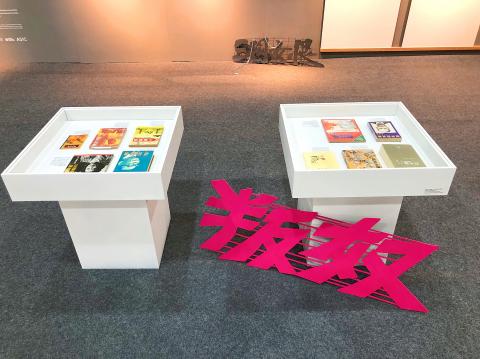Books that were banned in Taiwan during the White Terror era were displayed at the Seoul International Book Fair, which closed yesterday.
The Taipei International Book Exhibition Foundation contributed to the “Banned Books: Spirits from the Bamboo Grove” exhibition at the invitation of the fair, alongside publishers’ associations from Japan, Malaysia, Thailand and Turkey, as well as Seoul National University.
The chief planners of the Taiwanese content were publisher and former presidential adviser Rex How (郝明義), who is also the foundation’s managing supervisor, and Liao Wei-min (廖為民), who wrote The Story of Banned Books in Taiwan (台灣禁書的故事).

Photo courtesy of the Taipei International Book Exhibition Foundation
The organizations collaborated to display the formerly forbidden books to contextualize the history of literary censorship in Asia and to highlight the importance of freedom of the press, How said on Thursday.
Books on display were selected from the vast array of works proscribed during the White Terror era, or the period from 1949 to 1987 when the then-Chinese Nationalist Party (KMT) government ruled via martial law, he said.
The selection was a cross-section of the government’s press censorship, he said.
The government suppressed works of communist literature, such as Karl Marx’s Das Kapital and The Communist Manifesto, and books written by intellectuals who stayed in China after 1949, such as Lu Xun’s (魯迅) The True Story of Ah-Q (阿Q正傳) and Lao She’s (老社) Rickshaw Boy (駱駝祥子), he said.
The Legends of the Condor Heroes (射鵰英雄傳), a Wuxia novel — a genre of fiction about martial artists in ancient China — was banned because its author, Hong Konger Jin Yong (金庸), was suspected of having leftist sympathies and ties to Beijing, How said.
Books whose subject matter touched upon the 228 Massacre or the Japanese colonial era were banned, such as Su Ben’s (史明) Taiwan’s 400 Year History (台灣人四百年史), or books written by liberals who the government persecuted, including Lei Chen (雷震) and Yin Hai-kuang (殷海光), he said.
Chiang Kai-shek (蔣介石) and his son and successor Chiang Ching-kuo (蔣經國) also banned books by people who they held grudges against, such as Bo Yang (柏楊) and Chiang Nan (江南), he said.
Li Ai’s (李敖) books were banned because he was known for spurning authority, while An Anthology of Dangwai Literature (黨外文選) by Yao Chia-wen (姚嘉文) and Chen Chu (陳菊) was banned for being political literature originating from outside the KMT, he said.
The government also suppressed works deemed to challenge traditional sexual mores, such as sociologist Zhang Jingsheng’s (張競生) A History of Sex (性史) and Kuo Liang-hui’s (郭良蕙) The Locked Heart (心鎖), he said.

CHANGING LANDSCAPE: Many of the part-time programs for educators were no longer needed, as many teachers obtain a graduate degree before joining the workforce, experts said Taiwanese universities this year canceled 86 programs, Ministry of Education data showed, with educators attributing the closures to the nation’s low birthrate as well as shifting trends. Fifty-three of the shuttered programs were part-time postgraduate degree programs, about 62 percent of the total, the most in the past five years, the data showed. National Taiwan Normal University (NTNU) discontinued the most part-time master’s programs, at 16: chemistry, life science, earth science, physics, fine arts, music, special education, health promotion and health education, educational psychology and counseling, education, design, Chinese as a second language, library and information sciences, mechatronics engineering, history, physical education

The Chinese military has boosted its capability to fight at a high tempo using the element of surprise and new technology, the Ministry of National Defense said in the Quadrennial Defense Review (QDR) published on Monday last week. The ministry highlighted Chinese People’s Liberation Army (PLA) developments showing significant changes in Beijing’s strategy for war on Taiwan. The PLA has made significant headway in building capabilities for all-weather, multi-domain intelligence, surveillance, operational control and a joint air-sea blockade against Taiwan’s lines of communication, it said. The PLA has also improved its capabilities in direct amphibious assault operations aimed at seizing strategically important beaches,

The High Prosecutors’ Office yesterday withdrew an appeal against the acquittal of a former bank manager 22 years after his death, marking Taiwan’s first instance of prosecutors rendering posthumous justice to a wrongfully convicted defendant. Chu Ching-en (諸慶恩) — formerly a manager at the Taipei branch of BNP Paribas — was in 1999 accused by Weng Mao-chung (翁茂鍾), then-president of Chia Her Industrial Co, of forging a request for a fixed deposit of US$10 million by I-Hwa Industrial Co, a subsidiary of Chia Her, which was used as collateral. Chu was ruled not guilty in the first trial, but was found guilty

New Taipei City prosecutors have indicted a cram school teacher in Sinjhuang District (新莊) for allegedly soliciting sexual acts from female students under the age of 18 three times in exchange for cash payments. The man, surnamed Su (蘇), committed two offenses in 2023 and one last year, the New Taipei District Prosecutors’ Office said. The office in recent days indicted Su for contraventions of the Child and Youth Sexual Exploitation Prevention Act (兒童及少年性剝削防制條例), which prohibits "engaging in sexual intercourse or lewd acts with a minor over the age of 16, but under the age of 18 in exchange for